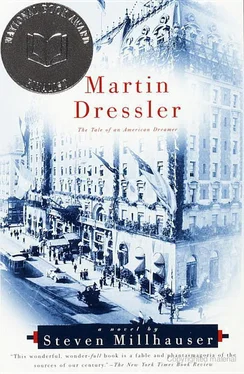On Sunday evenings he took to having dinner in the dark-paneled dining room of the Bellingham, at a small table near a window looking out on a vacant lot. Beyond the lot came snow-streaked vegetable gardens and the backs of four-story row houses. At his window Martin would read over reports or settle down with a newspaper before rising from his chair and nodding at clusters of fellow diners. Among them were three women who sat always at the same table, two tables distant from his own. They appeared to be a mother and two grown daughters, whom he never saw at breakfast, although one Saturday, when Mr. Westerhoven dismissed him early and he took lunch at the Bellingham, he saw them entering the dining room as he was rising to leave. What struck him about the picturesque group was that the mother and the older, dark-haired daughter talked easily together, while the pale-haired daughter with the pretty face sat eating in silence, with lowered eyes, which she raised only sometimes to look out the window. And whereas Mrs. Vernon — he had caught the name as a waiter delivered a dish — and the dark-haired daughter had begun to look his way, and to smile when Martin entered or rose to leave, the quiet daughter never looked toward him and, if she did not entirely ignore his greetings, restricted her acknowledgments to brief unsmiling nods, during which her gaze would fall to the left or right of his face.
One night when Martin returned to his hotel at about ten o’clock, after going over accounts with Walter Dundee and discussing the possibility of opening a second lunchroom farther uptown, he saw in one of the parlors off the main lobby the three Vernon women sitting in armchairs around a small dark table, on which sat three slender glasses filled with amber-colored liquid. As he passed the open doorway on his way to the elevators, he nodded at Mrs. Vernon, who smiled at him in so inviting a way that he hesitated in the doorway as he said “Good evening”—and moments later he found himself seated in an armchair between the mother and the fair-haired daughter, facing the dark-haired daughter. Mrs. Vernon laughingly introduced herself and her daughters: Caroline (fair) and Emmeline (dark). Martin formally introduced himself, felt irked at something stiff in his tone, immediately shook it off, and entered the spirit of Mrs. Vernon and Emmeline, both of whom were quick and intelligent and asked precise questions about his work at the Vanderlyn and his role in the transformation of the old Paradise Musée. Caroline Vernon, on his right, remained silent and apart, in a way that the others seemed not to mind. The dimmed light glowing through dome-shaped porcelain lampshades painted with landscapes, the quietness of the nearby lobby, the dark-red armchairs patterned with wavy gold leaves, the shine of dark wood and of the amber liqueurs in the longstemmed glasses, the quiet laughter of the women, the sense of intimacy about the small table, all this soothed something deep in Martin, who found himself speaking about his life and his plans until he suddenly stopped short with an apology and began asking questions of his own. Mrs. Vernon said that she was from Boston, where both girls had grown up. Mr. Vernon had been an attorney, who two years ago had been transferred to a big New York law firm and whose sudden death had been a devastating blow, though fortunately he had left his little family well enough provided for, though heaven knew you couldn’t be too careful, and on the advice of a family friend she had moved uptown into the wilderness, where the rents were half what they were downtown. Of course things were a bit slow out here, especially when you knew no one and had to watch every penny; and sometimes it seemed as if they were becalmed, simply becalmed, waiting for the wind to pick up and fill their sails. “So you’re a traveler, are you?” Martin asked Mrs. Vernon with a smile. “Oh,” Emmeline answered, “we’ve traveled extensively in the lobby of the Bellingham Hotel”—and she looked at him so playfully, so expectantly, that Martin felt he ought to make a witty reply, but he could think of nothing, and burst out laughing. Suddenly Caroline rose, said she was tired, and walked out of the room.
There was a moment of awkwardness, which Mrs. Vernon quickly covered with talk; and now that Caroline had left, Martin yielded entirely to the warm friendliness of the little circle in the lamplit parlor. When the evening ended nearly an hour later, with Martin’s discovery that it was practically midnight, he felt that an understanding had been reached: they liked each other, they had begun a friendship. And he had learned one fact that struck him: it was Caroline who was the older daughter, by two years, though she looked five years younger. Perhaps it was her small and almost childish features, especially her little girl’s nose, that made her seem younger than Emmeline, whose strong straight nose and black thick eyebrows gave her a look of masculine energy; her shoulders were broader, her voice deeper and more resonant, than Caroline’s. It struck him too that Emmeline in some sense watched over her sister, filled in gaps left by Caroline’s silence, took upon herself the task of speaking for both of them — while Caroline, with her pale hair pulled tightly back, so that it seemed to pull painfully against the skin of her temples, Caroline, with her delicate pale face and small mouth and large brown eyes looking away, Caroline Vernon, sunk in her dream, seemed the younger sister, protected by mother and older sister from unwelcome disturbances and intrusions.
Now every evening when Martin returned to the Bellingham after late hours at his office in the Vanderlyn, or supper with his parents in the small kitchen over the cigar store, on the familiar old plates with the blue Dutch children on them, or his weekly visit to the brothel on West Twenty-fifth Street, he would glance in at the lamplit parlor off the main lounge. There the Vernon women sat night after night, sipping bright-colored liquids from thin glasses. At a smile from Mrs. Vernon or a wave from Emmeline he would enter the parlor and sink into a waiting armchair, before the dark-gleaming table with its glowing dome-shaded lamp, an ivory-colored lamp with little Nile-green sailboats and a Nile-green island on the translucent porcelain shade and, on the porcelain body, little Nile-green houses on a Nile-green hillside — an admirable lamp, a really first-rate lamp that, he assured the Vernon women, with its removable oil fount and its excellent center-draft burner, was as hopelessly antiquated in the new world of incandescent lighting as the stage coach in a world of steam trains. Had they noticed, incidentally, that the overhead lights in the lobby and dining room were all electric, even the chandeliers? For it was interesting, it was a subject that never ceased to fascinate him, how the two worlds existed together, the world of oil lamps and incandescent lights, of horsecars and steam trains, one world gradually crowding out the other. Mrs. Vernon and Emmeline encouraged him to continue such discussions, Emmeline putting in a sharp, thoughtful question whenever something wasn’t absolutely clear to her, and both continued to question him closely about his work. Martin felt pleased and soothed to recount the minor adventures of his day: the resistance of Mr. Westerhoven to everything new, along with a secret willingness to give way in the face of superior argument; the slackness of the new bellboy, who had been caught smoking a cigarette in a fourth-floor corridor; Dundee’s brilliantly meticulous mind, which foresaw every expense and left nothing to chance, but which resisted anything daring or unusual, such as Martin’s suggestion that one of the two floors of billiard tables be reserved for women. His own father, a tobacco man of the old stamp, they didn’t make them like that any more, his own father still wouldn’t hear of stocking cigarettes — could anyone believe it? And he turned to Caroline, as if he were asking whether she was able to believe it; and Caroline lowered her eyes.
Читать дальше












